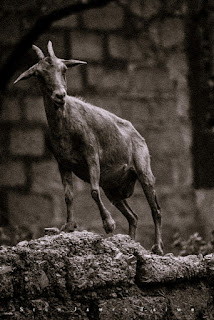The process of becoming is often as/more important than what is become.
Etched deep within the the socio-economic fabric of any developing nation is the immense contribution of cottage industries to its growth. The average cottage industry owner in Nigeria will have to grapple with the lack of basic amenities and infrastructure such as electricity, which ideally should aid his trade. Yet he has to be productive. After all, No food for lazy man, and Man must chop!
'Makeran tukunya' as they are popularly called in Northern Nigeria, this local blacksmith works out the clay mould for a cast aluminium pot while the aluminum is being melted on the side somewhere. Within an hour, he can produce 4-6 of the pots displayed in the photographs with little or no assistance and sell each at 700 naira.
Here presented are photographs I created showing a chronological work process of a local blacksmith I discovered in Kebbi state Nigeria. Every tool/equipment used by him was improvised/assembled by him to suit his intent.
Note-worthy however is the fact of the crudeness of his methods, and its impact on the environment, especially in a world where no amount of effort should be spared or overlooked in combating our common challenge of climate change.
 |
| 01 |
 |
| 02 |
 |
| 03 |
 |
| 04 |
 |
| 05 |
 |
| 06 |
 |
| 07 |
 |
| 08 |
 |
| 09 |
 |
| 10 - Self-assembled mechanical heating chamber. |
 |
| 11 - Aluminium (raw material) being melted. |
 |
| 12 - Alkaline batteries added to the melting mixture to speed up the rate of melting. |
 |
| 13 |
 |
| 14 - Impurities including alkaline batteries being sieved out of melted aluminim |
 |
| 15 |
 |
| 16 - Molten aluminium being poured into clay mold of pot covers |
 |
| 17- The liquid quickly solidifies within seconds. |
 |
| 18 - clay mold is broken and formed cast is brought out. |
 |
| 19 - The next batch is started immediately |
 | |
|
 |
| 21 -Almost finished product about to be trimmed and smoothed |
 |
| 22 -Metal waste collected that will be exchanged for aluminium to be used as raw material |
 |
| 23 - Sorting through the metal waste |
 |
| 24 |
As it Is with every other production process, 100% efficiency is a myth. There's always bound to be some waste. The waste however will serve as the raw material for the next batch.
The pots, varying in diameter and in depth are commonly used in most cultures of West Africa and possibly beyond as regular cooking utensil and are mostly used with coal or firewood stoves..
 |
| 25 |
"...and I believe that the best learning process of any kind of craft is just to look at the work of others". - Professor Wole Soyinka
- -
Thank you for stopping by. Unlike on the other social media platforms,
here there is more room for telling of visual stories and expression of thoughts.
So expect to see and hear new sides to some of these stories which you may already be familiar with.
S. J. T.
P.S. Comments will be highly appreciated!
- 02:25
- 4 Comments



































